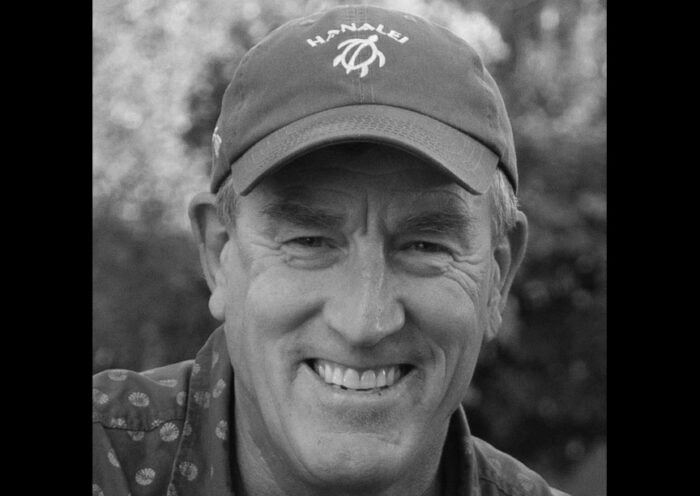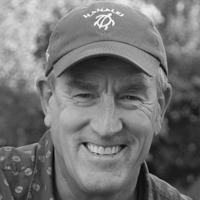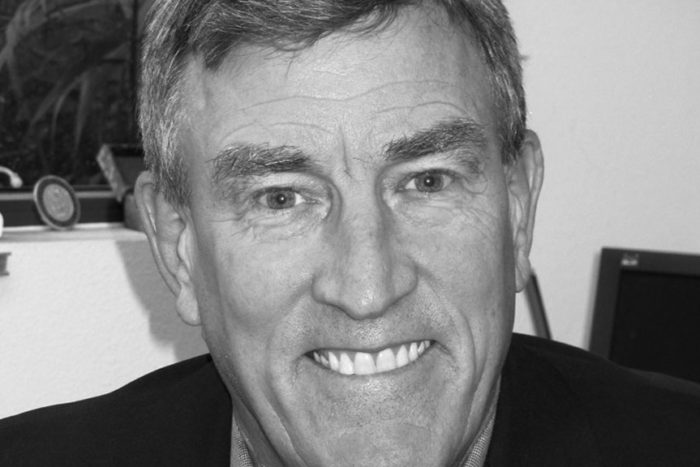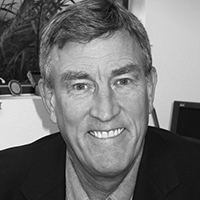The Best We Can
By William Cass
My parents told me about my mother’s affair, if it could be called that, when we met at the St. Francis Hotel in San Francisco just after I’d turned thirty. They’d come out from Pittsburgh and were staying there for one of my father’s last business conventions before his retirement. I’d flown down from my teaching job in Juneau, Alaska, to see them and stay with an old friend from college.
Their room was on the thirty-fourth floor. They sat side by side in tall, elegant armchairs separated by a small table. I stretched out against the headboard of their bed across from them. It was about 4:30 in the afternoon, and through the big windows behind my parents, the late October light had already begun to fall over the city.
When I’d first arrived, my father had made us all vodka tonics. We’d caught up on my brothers and sister, how my father’s keynote speech had gone the night before, and the progress on the retirement home they were building in Hilton Head, South Carolina.
Then he simply said, “Your mother has a bit of news. She’s slept with her old boyfriend from high school.”
The room was still for a long moment until my mother said evenly, “‘Slept’ is an exaggeration. We were in the backseat of his car at a park. It was over like that.”
She clicked her fingers. They both looked at me blankly.
I shook my head slowly. “I don’t know what to say. I can’t believe it.”
“Neither could I,” my father said. He took a long swallow from his drink and held the glass on the top of his knee.
My mother sighed. “It was just a ridiculous, impulsive thing. One time. Never before. Never again. I was in an emotional state. It was when I was up there in Connecticut to move your grandpa into the convalescent hospital.”
I sat forward and blurted, “The back of his car?”
“He’d heard I was there to move Daddy’s things. It’s a small town. He came by the house one night. We went for a drive.”
She shrugged. They both continued to look at me intently. It seemed like they were waiting for me to pass some sort of judgment.
Finally, I asked, “Do the other kids know?”
My father shook his head. “You’re the oldest.”
I extended my gaze over their heads at the dwindling light against the tops of the city’s buildings and wondered why my mother had told him anything about it at all.
I looked back and forth at each of them and asked, “So what happens now?”
My father pursed his lips. “I don’t know. We don’t know. No current plans. The truth is…” He shook the ice in his glass. “The truth is I’ve ignored your mother for some time…her needs.”
I’m not sure what it was I saw on my father’s face at that moment, whether it was fear or vulnerability or something else, but I know I’d never seen it there before. The rock-solid stoicism I’d grown to simply accept as his persona – the star athlete, the successful corporate executive, the stern family patriarch – was gone.
“We haven’t been emotionally available to each other for some time,” my mother said.
“Whatever it’s called,” my father mumbled.
I watched my mother lower her face, then turn it away from him toward the hotel room door.
I ended the awkwardness shortly after that by contriving excuses to leave. We made vague arrangements to have brunch together the next morning before they flew home. But before the elevator had even reached the lobby, I knew I would break those plans. I had nothing more to ask or say to them about what they’d told me and couldn’t imagine making small talk about anything else.
~
I relocated to Seattle a couple of summers later and met the woman who would become my wife at an orientation for teachers new to the district where we were both hired. After the wedding, we were able to buy a small, older home just up from Lake Washington on the eastside, and worked together fixing it up for the next few years until our son, Ben, was born. No one could have prepared us for that. He was severely disabled with a smorgasbord of developmental, physical, and neurological problems. He spent the first six weeks after birth in the NICU where the dymsorphologist who treated him there told us that kids like Ben rarely survived more than a handful of years. He was in and out of the hospital thereafter every few months for pneumonias and surgeries. It was during one of those admittances when Ben was seven that my wife announced that she’d become involved with another teacher at her school. She said they were moving together to Madison, Wisconsin, to enroll in a graduate program in art history, a subject in which I’d never known her to have any interest.
At the time, we were sitting in a little ante-room in the med-surg wing at Seattle’s Children’s Hospital waiting for Ben’s surgeon to come let us know how the procedure to insert a feeding tube into his stomach had gone.
She said, “I’m done being a martyr. I need to take care of myself. I have a right to be happy.”
“But,” I stammered. “You never said a word. I didn’t know…never had the chance…”
She looked at me coldly. Her eyes narrowed. “I can’t worry about your feelings. I can only deal with my own.”
The surgeon entered the room, still wearing his scrubs and operating cap. He smiled and said, “Everything went well. Everything is going to be all right.”
She nodded earnestly in that way she had when listening to someone. It had the effect of making the speaker feel immediately connected, acknowledged, and respected. So, the surgeon directed the rest of his comments to her. I sat numb and didn’t hear a word he said.
After my wife left, Ben had to stay in the medically fragile center of the hospital for better than a year because the first fundoplication had gone bad right away and the doctors decided upon a very gradual and careful titration of his feeds with the new feeding tube. He stayed on a continuous twenty-hour drip for seven weeks before they were finally able to slowly increase his intervals to greater bolus volumes. Towards the end of that time, he had a tracheostomy to help manage his secretions and then two additional surgeries to move his testicles down their canals closer to where they would have normally been. The customary recovery time was involved after each, so it was several more months before I could begin trying to arrange the contract home nursing needed to have him discharged. In the end, I was able to find nursing to cover my work hours, but overnight shifts only three times a week, so had to manage the rest myself. His care needs were round-the-clock, so I didn’t have a lot of time for much else.
~
My parents made a yearly visit my way to Seattle for a week each spring. Over the ensuing years after that afternoon in San Francisco, nothing much changed in their relationship that I could see. It seemed to me that they had fashioned their mutual co-existence with something between bewildered acceptance and silent resignation. In retirement, my father’s countenance and self-reliance gradually deflated like a balloon left behind a couch, and this became exacerbated as his hearing loss worsened, even with the most technologically advanced of aids. His golf games dwindled from four or five a week to once or twice a month, a decline that accompanied the degree to which my parents associated with friends. More and more, their days involved long periods of time sitting in separate blue recliners in front of the television reading sections of the newspaper, while my father kept one eye on whatever sports show played and my mother shouted tidbits to him from articles that caught her fancy over the volume’s din.
Their collective general health slowly deteriorated. After my father’s second heart attack and my mother’s first, we convinced them to move closer to one of the kids. They finally sold their retirement home and bought a cottage in a lovely graduated assisted living community on the Deschutes River in Bend, Oregon, near my sister, Beth, and her family. That made sense because she was the youngest and still had two small children with whom my parents planned to help. Although that assistance never materialized, Beth or her husband could take them to their medical appointments and lend a hand in managing their other affairs as needed, so it was an improved arrangement. However, shortly after arriving, my father began waxing nostalgic for Hilton Head, claimed that we forced him to move, and bitterness began to invade the shell that quickly became his final internal retreat.
On their last visit before my father died, my mother brought some old photographs to give me. She said she’d chosen a batch for each of the kids because they’d otherwise just sit untouched in a box in their attic. I looked through them that first morning as we ate breakfast together at my dining room table. It was already warm, so I had the French doors to the porch open. Ben sat in his wheelchair in the doorway where he could feel the sunlight across his lap and squawk when he heard the birds.
The order and arrangement of the photos seemed to be completely half hazard. There were some of my parents as far back as their days together at the University of Connecticut and then snippets of various family members – mostly different combinations of my four siblings and me, and later of our own families – over the years at holidays, vacations, and special occasions. Because they were so scattered, I found myself arranging them chronologically and, in so doing, watching us all grow and age in rapid succession.
I laid two photographs of my parents that struck me side by side on the table. They were both engrossed in their newspapers and didn’t even glance over. One snapshot was black and white from their honeymoon. My father had his arm around my mother, squinting with one eye into the sun behind the camera. They were leaning against a railing in front of a waterfall: handsome, robust, their serene expressions full of confidence and promise.
The second couldn’t have been taken too long beforehand. In it, they sat side by side at the little wicker table on their screened-in back porch in Hilton Head picking crab from shells in a bowl. It must have been among their last crabbing outings there, which was one of their only shared pastimes. They’d walk down under the bridge below the lagoon behind their house, and my mother would toss a chicken neck tied to a eight-foot string out into the brackish shallows at low tide. When a blue shell crab approached and began to follow the bait, she would slowly recoil the string towards the bank where my father waited with a long-handled net to try to snatch it up and drop it in a plastic bucket. On a good day, they could coax seven or eight crabs into the bucket in a couple of hours. I knew that it reminded them fondly, as it did me, of our crabbing and clamming excursions years before on the Connecticut shore or Cape Cod. In the picture, my father wore a startled expression and my mother grinned with her fingertips on his knee.
Somewhere in between those two photographs, they’d raised a family, our family, and tasted whatever satisfactions and disappointments life had in store for them.
~
Two things happened when Ben turned twelve that were significant. The first occurred on a rainy Sunday afternoon in the late fall. I took him to the IMAX theater at the planetarium to see a new movie that had opened about the Annipurna Sanctuary in Nepal where I’d trekked when I was younger. The theater had a small disabled seating section off to the side for wheelchairs with a couple of folding chairs for companions. A woman about my age already occupied one of the chairs. She was pretty. In the wheelchair next to her, a man was tilted back ready for viewing. His tongue lolled out of the side of the mouth. She wiped the drool off his chin with a blue paisley bandana that was tucked into the collar of his shirt.
I arranged Ben in a similar fashion and sat down in the chair next to her. When I glanced over, she was smiling gently at me.
“I’m Alice,” she said. “This is my husband, Paul.”
I shook her hand, introduced Ben and myself, and we talked a bit before the show started. She asked me about Ben’s prognosis.
I said, “Undiagnosed genetic syndrome.”
“From birth then?”
I nodded. “Paul?”
She sighed. “Car accident a year and a half ago. We were coming home from our daughter’s high school graduation.”
I swallowed and watched her look at him, then take his hand in his lap.
After the movie, she asked if I’d like to get coffee, and that started us doing things together with Ben and Paul every couple of months. It was nice to spend time with a person with whom I shared similar circumstances. Of course, that was as far as it could go.
The second thing was that, for the first time in his life, Ben hugged me back. It may well have been just an unintentional reflex of some kind because it had never happened before and hasn’t since. But that doesn’t matter…for a handful of seconds, it did.
~
Ben’s mom asked to see him again not too long ago, eleven years after she left.
As far as I know, she never married her lover, but they’d stayed together, and she called when they were passing through the area. They drove over, but he stayed in the car, parked down the street. I don’t know how to describe the way I felt when I answered the door – a cacophony of emotions, I guess, followed by emptiness. Much as they had with me, the years had taken their toll on her. She held herself with a cordial and dignified removal, but I saw something in her eyes that told me she was still the girl I’d married.
I brought her into Ben’s room where he was propped up in his bed in the middle of a feed.
“Benny-boy,” she whispered and kissed his forehead. He looked past her at whatever it was that he always gazed at. She rearranged and propped the pillows around
him, and I felt the old, painful, instinctive twinge of never doing things well enough for her.
She didn’t ask, but I gave her a summary of how Ben had been doing while we both looked at him and she stroked his hair. Then we were silent. I wondered what more it was that we could really talk about. The motor on his feeding pump made its soft whee-whir.
“I’ll give you some time with him,” I said and left the room.
I busied myself in the kitchen, unloaded the dishwasher, rinsed out the coffee carafe, threw out the grounds. Then I went into the sunroom, sat on the couch, and tried to grade some papers. At one point, I thought I heard her reading aloud to him from one of the picture books on his shelves. It may have been a book she bought for him; it probably was. After a while, I was sure that I heard her singing softly to him a lullaby that had been a regular one for them when he was an infant.
I looked out the window at the picket fence we’d built together just after we bought the house and before Ben was born. The climbing roses we’d planted on either side of the gate had grown over the arbor into a tangle of red bursts and green foliage that nodded now in the small breeze and sunlight.
Perhaps ten minutes more passed before she came to the front door, gave me one of her familiar, sad smiles, and said, “Thank you.”
I watched her go down the steps, through the gate, and up the sidewalk to where the car was parked under a tree. I could just make out his figure behind the wheel in the
shadows. Ben’s pump began to beep, signifying that his feed cycle had finished, and I went to turn it off.
~
Not long thereafter, my mother was diagnosed with a relatively mild case of Alzheimer’s disease. She was about to turn seventy-six and had become increasingly forgetful the past few years, so we weren’t surprised. Neither was she, though she was frightened by how debilitating the disease had become at the end of her own father’s life. Her neurologist put her on a medication that he said might slow the process and directed her to be as active mentally, socially, and physically as possible. She’d moved into an apartment in the lodge after my father’s death and already had a fair amount of acquaintances there. With the diagnosis, she increased her canasta games to twice a week and began to take more meals in the dining hall with other residents. She also joined an exercise class and got a subscription to a monthly word search magazine. So, she did all right.
She still came here for her most recent visit. Only a short, direct flight was involved, so there weren’t any travel problems. But during our last phone conversation, my sister had expressed some new concerns about the dangers of her being on her own much longer. Beth said that not too long before, she’d found a stove burner left on overnight when she went over to the apartment. There was another recent occasion when they’d had to take her to the ER after she’d confused some of the medications she’d taken. We both wanted her to maintain as much dignity and independence as possible, but Beth was wondering if the time wasn’t approaching when she’d need to move upstairs into skilled nursing, especially in light of her own family’s likely move to another state because of a pending work transfer for her husband. Beth asked if I could talk to her about it; I said I would.
After we got home from the airport and settled, she did appear to me a little more fitful, more methodical. Maintaining her daily routines seemed especially critical to her:
counting out her pills in the morning, taking care of her ilioscopy bag and all that entailed, fixing her tea and crustless toast for breakfast, pouring endlessly over the
newspaper, watching her afternoon talk shows on television. She shuffled everywhere, and complained more about how she was always cold, how she couldn’t keep any weight on, about the blue veins in her legs and her sleeping troubles. The glass rarely seemed half-full.
That first day, we walked up the street with Ben to a little café she’d always liked for lunch. After our meals arrived, she told the waitress that her soup wasn’t hot enough and sent it back to be reheated. She commented that the potato salad was all right, but not as flavorful as her own.
I finally said, “Tell me something good, Mom. Something good that’s going on with you.”
“Well,” she said. She took off her glasses and pinched the bridge of her nose before replacing them. I could see that she was trying not to smile. “Warren Marshall has been calling.”
“What’s that?” I vaguely remembered the name, but couldn’t place it.
“Warren. My high school boyfriend.”
I thought of that afternoon in the St. Francis Hotel. I said, “How? When?”
“Well, he phoned me after he heard your father had died. And he’s called several times since. Just to check on me, he says. We don’t talk about much. I don’t think his marriage is a very happy one. I’m not sure if he’s even married anymore.”
She took a sip of soup, it seemed to me, to hide the sparkle in her eyes. The spoon trembled a bit in her hand. I sat back and shook my head. Who knew how many years she had left? I thought about how much of life hinged on those things we could control and those things we couldn’t. I thought about how we go about trying to fashion our truest selves. I thought about how we all just do the best we can.
I heard myself say, “Why don’t you find out?”
She shrugged. She looked out the window and set her spoon down. “The last time he called, he talked about taking a trip out this way. He has a grandson who goes to college in Portland. Said he might rent a car and drive down to Bend.”
When she looked back at me, her lips were trembling a little, too, her eyes full of hope and fear and uncertainty. She looked so small and frail. In that moment, I knew there was no need for the conversation about skilled nursing; when the time came for that, I’d move her up to live with me. I reached over and put my hand on top of hers. I smiled, and she made a thin attempt to do the same.
After a while, she looked over my shoulder and said, “This is a nice place. It doesn’t look new. We should have come here before.”
I squeezed her hand and said, “You’re right, Mom. We should have.”
Originally appeared in Conium Review (2013)
BIO
William Cass has had over 290 short stories accepted for publication in a variety of literary magazines such as december, Briar Cliff Review, and Zone 3. He won writing contests at Terrain.org and The Examined Life Journal. A nominee for both Best Small Fictions and Best of the Net anthologies, he has also received five Pushcart Prize nominations. His first short story collection, Something Like Hope & Other Stories, was published by Wising Up Press in 2020, and a second collection, Uncommon & Other Stories, was recently released by the same press. He lives in San Diego, California.




 William Cass has had over 150 short stories accepted for publication in a variety of literary magazines such as december, Briar Cliff Review, and Conium Review. His children’s book, Sam, is scheduled for release in April, 2020. Recently, he was a finalist in short fiction and novella competitions at Glimmer Trainand Black Hill Press, received a Pushcart nomination, and won writing contests at
William Cass has had over 150 short stories accepted for publication in a variety of literary magazines such as december, Briar Cliff Review, and Conium Review. His children’s book, Sam, is scheduled for release in April, 2020. Recently, he was a finalist in short fiction and novella competitions at Glimmer Trainand Black Hill Press, received a Pushcart nomination, and won writing contests at 











